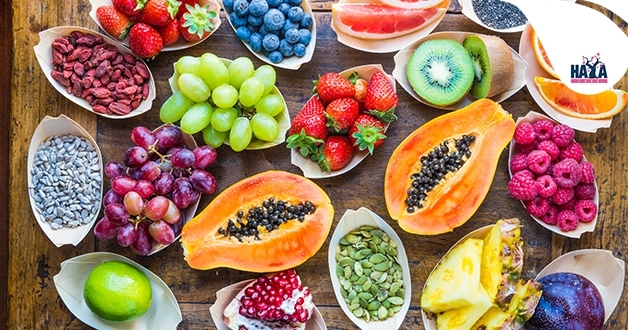
Satisfy your sugar cravings with healthy fruits
0
1448
Why, instead of a piece of cake, do not eat some fruit or as we like to call them "candy to nature"? The fruit will satisfy your need for sweet, but not harmful to health and feelings of guilt.
Here are ten of the healthiest fruits that will satisfy your appetite for sugar.
1. Blueberries
Blueberries top the antioxidant content rating among 40 other fruits and vegetables. That's why if you eat something sweet but want to be healthy, blueberries are the right choice.
Researchers at Tufts University say that regular consumption of blueberries strengthens short-term memory.
A study published in the Nutrition magazine in 2010 makes it clear that the daily consumption of blueberries provides the body's bioactive ingredients. It is these that increase insulin sensitivity and may reduce the risk of developing Type 2 diabetes as well as insulin resistance. It has been found that 67% of people who drink bilberries twice a day for six weeks have a 10% improvement in insulin sensitivity.
It is believed that the high content of antioxidants in blueberries helps fight some types of cancer, especially cancers of the mouth, colon cancer, and prostate cancer.
Blueberries are also a good option for people who are trying to lose weight. Not only will their sweetness hinder you from eating a whole pack of Oreo biscuits, but they will actually help you burn fat on your stomach.
The results of a study at the University of Michigan show that obese rats fed blueberries lose fat from their stomachs, whereas the placebo group of rodents does not take such an effect.
A cup of blueberries contains only 84 calories and provides 36% of the recommended daily intake of vitamin K, 25% of that of manganese and 24% of the daily vitamin C dose
2. Apples
Apples are another great choice for dessert, especially for people who are trying to lose weight. They are rich in fiber and have a low glycemic index.
The results of a study show that eating apples rather than biscuits helps you lose weight. In the experiment, women participated, one consuming three apples, the other three pears, and another three oat biscuits a day. It has been found that ladies who have given fruit have lost about 1.3 kg over a 12-week period.
Apples are also suitable for people with respiratory problems, especially for those suffering from asthma.
According to one study in people who include in their menu from two to five apples a week, the risk of developing asthma is 32% lower than those who consume less.
Another study also found that women who consumed four or more apples a week during their pregnancy had 50% less chance of having a child with asthma than women who ate one or fewer apples per week.
A medium sized apple contains 95 calories, 17% of the recommended daily intake of fiber and 14% of that of vitamin C.
3. Pineapple
Pineapple is naturally sweet and juicy and is, therefore, an excellent substitute for all unhealthy pastries.
A cup of pineapple will add only 82 calories to your waist but will provide 131% for your daily vitamin C needs and 76% of the recommended daily manganese value.
This tropical fruit is so impressive because it is one of the richest sources of the enzyme bromelain.
Bromelain is an important aid in the digestive system, prevents allergies and asthma and reduces inflammation and joint pain.
A study in 2014 shows that bromelain really has a powerful pain-relieving effect. Researchers assessed its ability to reduce postoperative pain in patients who have just removed a tooth. Those who were prescribed bromelain had "significantly less" pain, swelling, and redness compared to people taking traditional painkillers.
4. Kiwi
Eating kiwi after eating instead of chocolate dessert is a good idea for several reasons. In addition to containing calories, sugar and fat in a minimal amount, kiwi is also beneficial for the digestive system.
Kyut contains actinidine - an enzyme that breaks down proteins. Laboratory experiments and animal studies have shown that this compound may improve the absorption of proteins in the intestine. Correspondingly, kiwi is an ideal dessert when you eat plenty of protein-rich dishes.
If you suffer from constipation or any other type of digestive discomfort, kiwi will help you cope.
A study involving 33 patients with chronic constipation found that eating two kiwis a day for two weeks significantly improved their condition. This is due to the fiber in the fruit, which has a slightly laxative effect.
Other studies have shown that kiwi is useful for people diagnosed with irritable bowel syndrome. Consumption of two kiwis per day for one month relieves swelling, cramps and abdominal pain.
Medium kiwi has only 46 calories and provides you with 117% of the recommended intake of vitamin C. It also covers 38% of the daily requirement for vitamin K and 9% of the fiber.
Do you want extra nutrients? The kiwi skin contains more antioxidants than the inside. The envelope has antiseptic properties and prevents the spread of harmful bacteria in the stomach. If you think of eating the kiwi shell, however, you should carefully rinse it.
5.
read more
The watermelon is the perfect summer fruit, it is sweet, refreshing and moisturizing. But do you know that the watermelon can protect your heart?
The citrulline substance contained in the watermelon is believed to interact with body enzymes and processed into arginine - an amino acid that supports the work of the heart, the bloodstream and the immune system.
A study investigating the effects of watermelon on heart health in mice found that rodents who take watermelon juice have about 50% less plaque in the arteries of mice that did not consume it. They also have lower cholesterol levels and minimal weight gain.
Another substance in the watermelon, called lycopene (also found in tomatoes), further protects the heart. In 2011, South Korean scientists are conducting research to prove that lycopene reduces oxidative stress, blood pressure levels and inflammatory processes in the body.
220 grams of watermelons contain only 46 calories, and they cover the body's daily needs of vitamin C by 21% and those of vitamin A by 17%.
Watermelon also boasts many other health benefits, such as preventing muscle aches and providing smooth and soft skin.
6. Cherries
Cherries are tasty and low-calorie food. They help relieve pain in the muscles, and when it comes to inflammatory conditions such as gout and osteoarthritis are particularly appropriate.
According to a 2012 study, daily cherry consumption reduces the risk of gout attacks by 35%. The experiment involved 633 people who were observed for one year.
The results of another study involving women with osteoarthritis show that drinking cranberry juice twice a day over a three week period significantly reduces inflammatory markers in the body.
If you suffer from muscle pain after exercise, it will be very beneficial for you to consume a certain amount of cherries. It has been shown that athletes who drink cherry juice twice a day for one week before and during intense workout experience fewer muscle pains than athletes who do not drink.
Cherries are a good source of melatonin, whose deficiency is associated with sleep problems. If you suffer from insomnia, drink a cup of cherry juice half an hour before bedtime.
220 grams of cherries provide 87 calories, 16% of the recommended daily intake of vitamin C and 12% of fiber.
7. Oranges
For starters, oranges can improve kidney status as they contain citrates that prevent the formation of stones. Some kidney stones can grow to the size of a golf ball, so if you are at risk of this painful disease, eat more oranges.
Oranges contain flavonoids such as Hesperidine, which lowers cholesterol levels and prevents blockages in the arteries. This reduces the risk of heart attack as well as cardiovascular diseases.
One regular orange has 62 calories and delivers you 116% of the daily vitamin C required, 13% of the fiber and 10% of the recommended intake of folate (vitamin B9).
8. Bananas
Bananas are one of the most consumed fruits in the world and this is perfectly understandable because they are delicious, satiating and very sweet.
According to the American Heart Association, a diet rich in natural potassium sources is an important prerequisite for controlling blood pressure. This is because potassium actually reduces the levels of sodium in the body, and it is known to cause hypertension (high blood pressure).
A number of studies (conducted between 1966 and 2009) on the relationship of potassium to blood pressure and heart health found that taking about 1.3 grams of potassium a day reduced the risk of heart disease by 26 percent.
One large banana contains almost 0.5 grams of potassium, in addition to 121 calories, 25 percent of the recommended daily vitamin B6, 20 percent of vitamin C, 18 percent of manganese daily and 14 percent of fiber.
9. Papaya
220 grams of this fruit will provide you with 144% of the daily vitamin C dose, 31% of the vitamin A needs, 13% of the daily folic acid requirement, and 10% of the potassium and fiber requirements.
The calories you receive from this quantity of papaya are only 55.
Papaya is one of the biggest sources of vitamin A. This fat-soluble vitamin is important for the health of the skin, teeth, and tissues. Vitamin A is so valuable to the sight that its deficiency can lead to night blindness. The lack of vitamin A is also associated with inflammation of the intestine, lungs, and skin.
This delicious tropical fruit is also helpful in reducing swelling, removing high temperature and wound healing after surgery.
Papain contained in papaya helps digest foods rich in protein (meat, eggs, cheeses, fish, and nuts), so it's an excellent choice for a healthy dessert.
10. Avocado
When you think of what fruit to eat, you rarely think of avocado. Although not as sweet as the other berries on this list, avocados deserve to be mentioned.
"Good" avocado fat stabilizes blood sugar levels. A recent study found that eating only half an avocado with the main meal helps overweight people feel more fortunate. Experienced participants reported 40% less desire to eat over a three-hour period and 28% less desire for five hours after the main meal.
An avocado offers nearly 20 vitamins and minerals, including 53% of daily vitamin K, 41% of folate, 33% of recommended vitamin C, 28% of potassium and 21% of daily vitamin E needs.


